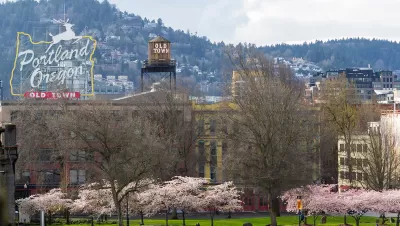The city of Portland's new residential infill ordinance would reduce the number of 1:1 demolitions—which often convert older, affordable homes into expensive McMansions.

Portland is ready to pick up its consideration of an infill development ordinance meant to curb the development of McMansions and spur the development of missing middle housing.
As Michael Andersen reports for Portland for Everyone, the idea behind the ordinance is that "amid a housing shortage, it’s stupid that so many construction sites are spending half a million dollars to replace one house with one house."
The Portland City Council approved the legislation in concept in October 2016, but now the ordinance is back in draft form and ready for finishing touches.
Andersen describes the two big ideas at the core of the new legislation:
- The maximum size of new buildings in lower-density residential districts would drop sharply, reducing the total number of demolitions.
- In much of the city, the new, smaller structures that are built could legally be duplexes, triplexes and clustered cottages, increasing the total number of homes — especially small ones.
Andersen places the new legislation in context of the city's skyrocketing housing costs—almost every freestanding home in Portland's pre-1940 street grid now costs more than $400,000.
FULL STORY: Portland’s anti-McMansion compromise is filling in details and nearing a final vote

Alabama: Trump Terminates Settlements for Black Communities Harmed By Raw Sewage
Trump deemed the landmark civil rights agreement “illegal DEI and environmental justice policy.”

Study: Maui’s Plan to Convert Vacation Rentals to Long-Term Housing Could Cause Nearly $1 Billion Economic Loss
The plan would reduce visitor accommodation by 25% resulting in 1,900 jobs lost.

Why Should We Subsidize Public Transportation?
Many public transit agencies face financial stress due to rising costs, declining fare revenue, and declining subsidies. Transit advocates must provide a strong business case for increasing public transit funding.

Wind Energy on the Rise Despite Federal Policy Reversal
The Trump administration is revoking federal support for renewable energy, but demand for new projects continues unabated.

Passengers Flock to Caltrain After Electrification
The new electric trains are running faster and more reliably, leading to strong ridership growth on the Bay Area rail system.

Texas Churches Rally Behind ‘Yes in God’s Back Yard’ Legislation
Religious leaders want the state to reduce zoning regulations to streamline leasing church-owned land to housing developers.
Urban Design for Planners 1: Software Tools
This six-course series explores essential urban design concepts using open source software and equips planners with the tools they need to participate fully in the urban design process.
Planning for Universal Design
Learn the tools for implementing Universal Design in planning regulations.
Caltrans
Smith Gee Studio
Institute for Housing and Urban Development Studies (IHS)
City of Grandview
Harvard GSD Executive Education
Toledo-Lucas County Plan Commissions
Salt Lake City
NYU Wagner Graduate School of Public Service




























